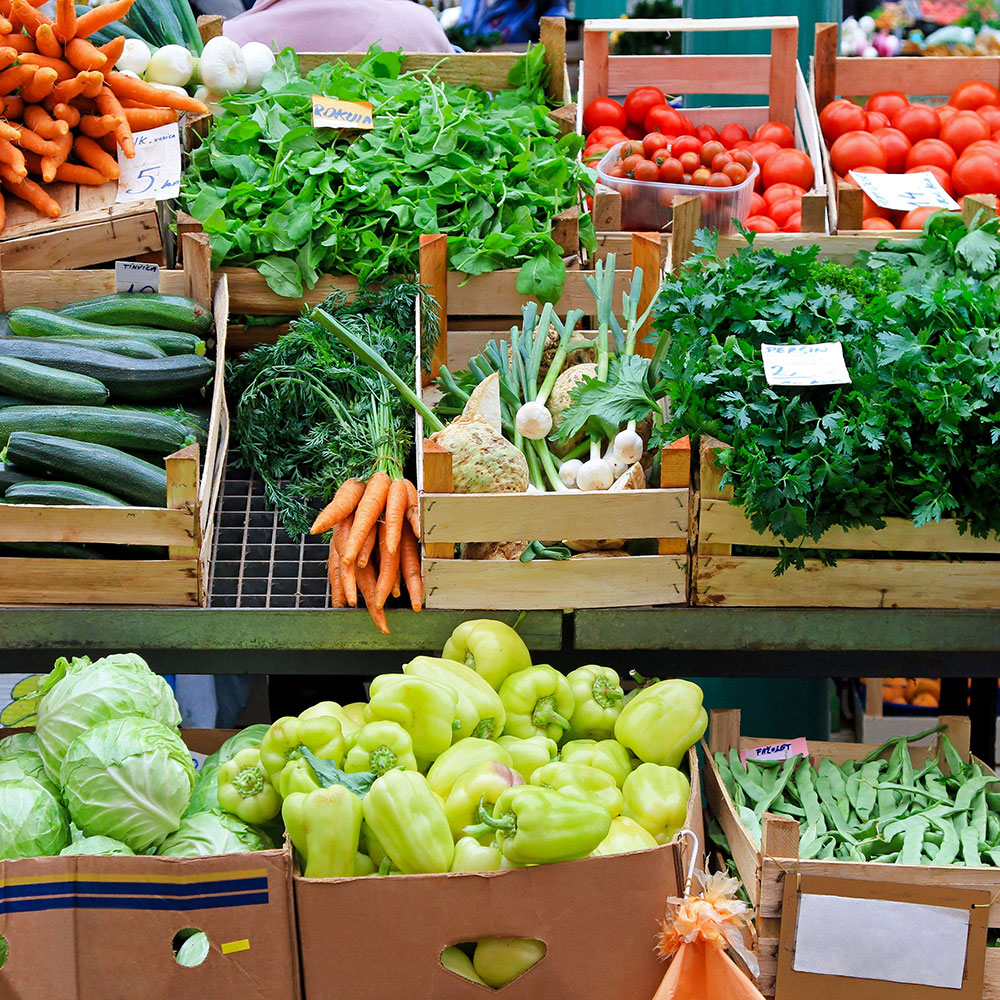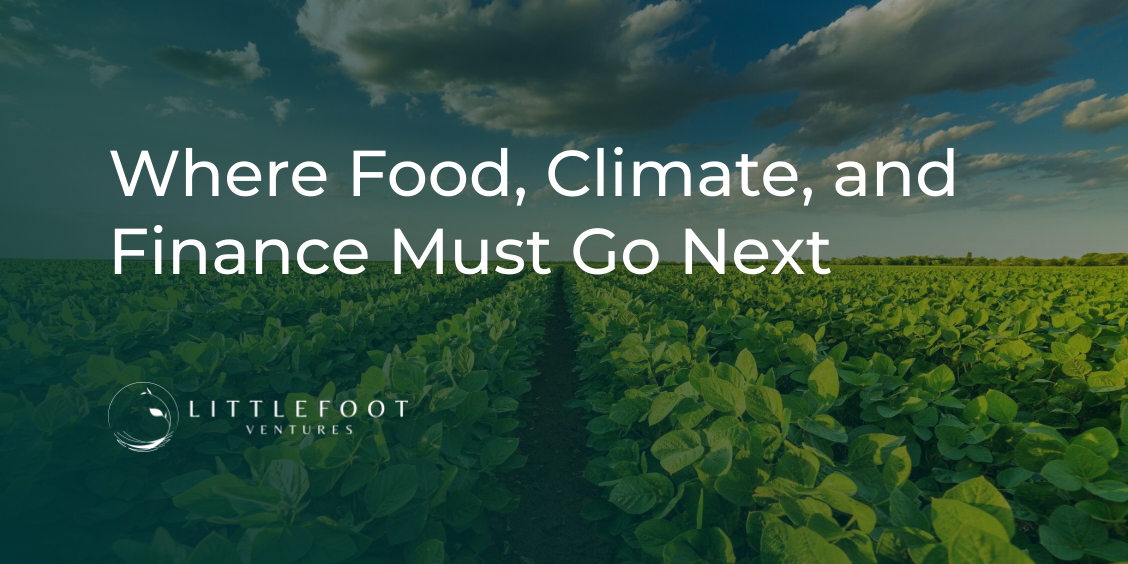Dear Colleagues,
As the autumn summit season approaches—with New York Climate Week, UNGA, and COP30 on the horizon—I’ve been reflecting on what this past year has meant for those of us working at the intersection of food, climate, and finance, and where I think the real opportunities are right now.
It’s been a bumpy year for the sustainability space. Federal funding is uncertain, and more of the weight is falling on philanthropy and the private sector to keep things moving. At the same time, major leadership changes—from food giants like Unilever, Kroger and Albertsons to the World Economic Forum—are reshaping how money flows into food systems. In the midst of all this turbulence, the question isn’t if we need to do things differently, it’s how we’re going to do so.
Business Leadership in Food Systems
In my client work with the US Food Waste Pact, The Food Industry Association (FMI), and Google, I’ve seen firsthand how the conversation has evolved. Retailers, tech companies, and food service providers have already made the big commitments on food waste. The real work now is execution, and the imperative has shifted from “sustainability is good” to “sustainability drives business value.” Companies are under pressure, with lean teams and budgets, so the focus must be on turning cost centers into profit centers.
This is an invitation to sustainability leaders: reimagine your strategy more aggressively through a business lens. You don’t need to check every box, you need to prioritize what drives the bottom line.
Financing the Transition
The case is clear: food systems receive less than 3% of climate finance, far below what’s needed. Blended finance (uniting public, private, and philanthropic investments) can reduce risk, unlock catalytic capital, and accelerate solutions that improve sustainability, resilience, and nutrition worldwide.
Financial innovation has never been more urgent. That’s why Littlefoot Ventures supported BCG on the COP28 Action Agenda on Regenerative Landscapes (AARL), which demonstrates the scale of what’s possible when we align blended capital with food and sustainability initiatives. We also published an Insights Report titled Beyond Energy: Why Food Systems Are the Next Essential Focus for Blended Finance to build on this idea and spread the word on the importance of reimagining capital stacks.
The Role of Strategic Philanthropy
Philanthropy remains a critical market accelerator. In Alliance Magazine, I published two articles arguing that philanthropy must bring food and climate into the same conversation, and that it is uniquely positioned to de-risk early-stage food system investments. At the Global Philanthropy Forum Leaders Summit, I spoke with BCG’s Shalini Unnikrishnan about how philanthropy can unlock scalable solutions like their work in Brazil’s Cerrado, where a public-private initiative is protecting 43 million hectares, cutting 140 MTCO₂E, and boosting farmer livelihoods. I remain convinced (and take every opportunity to remind anyone who will listen!) that bold philanthropic risk-taking is one of the few levers capable of unlocking systemic change, and it’s exactly what this moment demands.
Building Narrative Power
Of course, funding follows compelling stories. Climate-focused philanthropy has skyrocketed—growing over 300% in just five years, now topping $4.8 billion annually. But only organizations that communicate their climate relevance clearly will gain access. That’s why we launched the Climate Messaging Mastery Course, equipping nonprofits to capture their share of that funding. What began as a live program with 27 organizations across five continents is now available on-demand, making it easier than ever for organizations to strengthen their climate communications.
This storytelling thread continues with my podcast, Everything But the Carbon Sink. I just wrapped my first season and I was fortunate to be able to have 16 amazing conversations with trailblazing leaders at the intersection of food, climate, and capital. A key takeaway for me was that there is far more hope and innovation happening than many realize. Partnerships and blended finance are proving to be powerful levers of change.
So as you prepare for your own Climate Week, UNGA, or COP agendas, I encourage you to ask: Who is an unexpected collaborator for me this season? The truth is, you likely already have the tools and partners you need to drive impact. And if you don’t… well, that’s what Littlefoot is here for. Please reach out to me at any time to share thoughts, ask questions, or facilitate introductions.
Yours in partnership,
Eva Goulbourne
Founder & CEO, Littlefoot Ventures
Insights for Impact
Beyond Energy: Why Food Systems Are the Next Essential Focus for Blended Finance
Littlefoot Ventures
Food systems are responsible for 34% of global GHG emissions but receive only a tiny fraction of climate finance—just 2.5% of public funds and 7% of philanthropic giving. This report argues that current funding levels are far too low to meet the scale and urgency of food systems transformation and makes the case for using blended finance to unlock more capital. By combining public, private, and philanthropic investments, blended finance can reduce investor risk, mobilize catalytic capital, and accelerate solutions that improve sustainability, resilience, and nutrition across global food systems.
Everything but the Carbon Sink Podcast
Littlefoot Ventures
What if reimagining how we grow and fund our food could help save the planet? Season 1 of Everything But the Carbon Sink explored this question through candid conversations with trailblazing investors, founders, nonprofit leaders, and policymakers at the intersection of food, climate, and capital. Each episode cut through the noise to spotlight the innovations, investments, and partnerships driving food system transformation.
The Most Important Food Policy Changes of 2025 So Far
Civil Eats
The Civil Eats tracker has covered Congress’ actions and the Trump administration’s efforts to transform the federal government as well as emerging Make America Healthy Again (MAHA) developments.
Events
- Sept 9-28 | New York, NY | UN General Assembly (UNGA 80)
-
Sep 21-28 | New York, NY | New York Climate Week
-
Oct 7-8 | Minneapolis, MN | Regenerative Food Systems Investment Forum
-
Oct 28-30 | San Jose, CA | GreenBiz Verge
-
Nov 10-21 | Belém, Brazil | COP30
-
Nov 19-20 | Anaheim, CA | Sustainable Agriculture Summit
-
Jan 19-23 | Davos, Switzerland | World Economic Forum Annual Meeting


